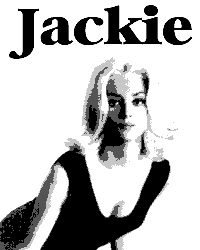Click on Jackie to return to page one.

Gone 5008, released in 1957 on 45rpm and 78rpm singles coupled a ballad, “How Wrong I Was,” with an updating of a song which had already done well for Faye Adams (Herald 419) and Bill Haley (Essex 340). “I’ll Be True” can best be described as a mid-paced stroller, which Jackie attacks with confidence, attitude and a god deal of Kentucky twang, well supported by an enthusiastic vocal group chorus and a couple of rather tinkly guitar solos. “I’ll Be True” is the track chosen for this CD set, and the reproduction is clean and pristine - you’ll hear the song as you‘ve never heard it before, and I’m fairly certain that it is its first outing on CD, and indeed anywhere since 1057 (apart from a certain mysterious tape once circulated by the Jackie DeShannon Appreciation Society...)
There are other delights on this compilation, too, indeed most of the other 64 tracks are worth hearing. The Gone label lasted from 1957 to 1964, and not surprisingly its output included most styles from doo-wop (lots of it on this collection) to rhythm-and blues via teenage pop and instrumentals. There weren’t many hits (the spicy Jo-Ann Campbell and the would-be Elvis Ral Donner being exceptions), but you can get to sample early work by Johnny Rivers, The Isley Brothers, The Four Seasons and Louisiana soul star Johnny Adams, as well as latter-stages-of-career material by the likes of Cab Calloway and Bill Haley (the infuriatingly catchy should-have-been-a-hit “Spanish Twist”). And there are curiosities, like one Andrew Taylor, who sings in quite a different key from his backing vocal group, and a twangy guitarist called Tony Castle, produced by Lee Hazlewood, who definitely isn’t (it says in the liner notes) Duane Eddy. The liner notes are detailed and entertaining, incidentally. I recommend this CD first and foremost for those who love Jackie’s early tracks, and also for anyone who likes sampling obscure 50s/60s music.
